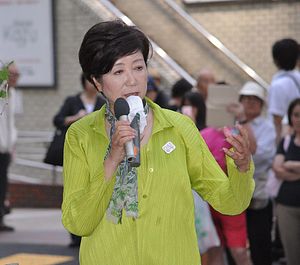On July 2, Prime Minister Shinzo Abe’s Liberal Democratic Party (LDP) suffered a historic defeat in the Tokyo metropolitan elections. Though on one level, the election was about how Tokyoites felt about Governor Yuriko Koike’s year in the governor’s office so far, on another level, it was a condemnation of the LDP’s “arrogance” in the past months. Abe accepted the results as a “very severe judgment” on his administration.
The LDP has been under fire for Japan’s peacekeeping operation in South Sudan, and the way the party shut down debate on a controversial anti-conspiracy bill to get it passed before the summer recess. Abe has also been personally accused of being involved in two separate favoritism scandals, though he has denied any wrongdoing on both counts. Abe’s support rate slid down to 38 percent last weekend.
In the 127-member assembly, which governs a population of 13.7 million, Koike’s new party, the Tokyo Citizens First party, and its allies took 79 seats. Though the Komeito Party is allied with the LDP at the national level, in this metropolitan election, they allied with Koike, a former LDP member.
The LDP won 23 seats – its worst-ever result. The Democratic Party (DP) won only five.
This weak showing gives Abe’s rivals an opening to challenge him in September 2018’s leadership race. If Abe wins the LDP presidency next September, he would be on track to become Japan’s longest-serving leader; an outcome that no one would have questioned until a few days ago. But while Shigeru Ishiba, a long-time rival, has taken the opportunity to attack Abe for this “historic defeat,” Abe allies are also closing in to protect him – LDP heavyweight Taro Aso has pledged his continued support, and that of his newly formed faction, to the prime minister. Aso, who serves as deputy prime minister and finance minister, now heads the second-largest faction within the LDP.
Politically, there are three things to keep an eye on.
The most immediate issue will be the upcoming Cabinet reshuffle. Abe had been planning on shaking up the Cabinet before the election, so the reshuffle itself is not a surprise. However, it has taken on greater significance now, as personnel decisions must be made to show the public his commitment to reform and to regain the public’s trust. Whether or not Tomomi Inada continues as defense minister will be particularly noteworthy. Though she is one of Abe’s favorites, her gaffe of asking Tokyoites to vote for the LDP on behalf of the Self-Defense Forces (SDF) has garnered a lot of criticism.
The medium-term development to note is how the Komeito and DP react to this. Komeito has continued to support the LDP, but ideologically, tensions have been building for some time now. Will the Tokyo election results catalyze a split at the national level? Or will it force the LDP to more assiduously court the Komeito? And as to the DP’s results, though terrible, the DP is still the only opposition party of relevance – however limited that relevance might be – at the national level. What is the DP’s takeaway from this election? Will they try to imitate Koike’s message of reform?
And, of course, the question everyone wants to know the answer to is whether Koike has national ambitions to become Japan’s first woman prime minister. At this time, Koike herself probably does not know, and she has been playing it safe by publicly stating that her focus is on the local level, as she takes on local issues such as cost sharing for the 2020 Olympics and the relocation of the Tsukiji fish market.
Koike’s triumph over the LDP is especially ironic as she used to belong to that party. This isn’t her first victory over her old party, either; in 2016 she ran an independent campaign for governor when the LDP threw its weight behind another candidate, and won handily. Though she offered her resignation from Japan’s ruling party in June, it was only accepted by the LDP on Monday, a rather meaningless move by that point.
After the election, Koike resigned as head of the Tokyo Citizens First Party to focus on her role as governor. Should she decide to reengage at the national level, it will likely be after 2020. Significant hurdles remain, however, as a message that resonates with Tokyo residents (“Putting Tokyo first!”) would be hard to translate into a national campaign.
Policy-wise, the most obvious impact this has is on Abe’s push to reform the constitution. Prior the election, Abe had wanted to revise the constitution before 2020, but as this is a controversial move, he may no longer have the political capital to push forward with it.
The poor showing could also further delay the increase in the national sales tax to 10 percent. The raise is currently scheduled for 2019, and a decision needs to be made sometime in the middle of 2018.

































